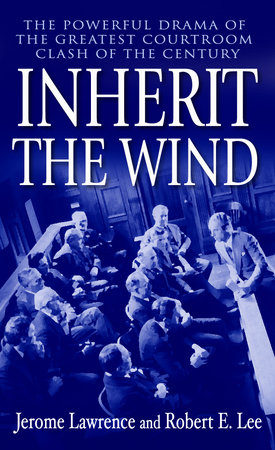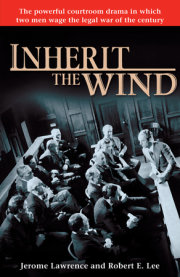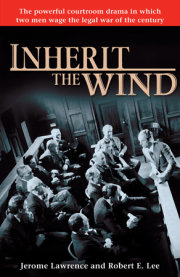ACT ONE
SCENE I
In and around the Hillsboro Courthouse. The foreground is the actual courtroom, with jury box, judge’s bench and a scattering of trial-scarred chairs and counsel tables. The back wall of the courtroom is non-existent. On a raked level above it is the courthouse square, the Main Street and the converging streets of the town. This is not so much a literal view of Hillsboro as it is an impression of a sleepy, obscure country town about to be vigorously awakened.
It is important to the concept of the play that the town is visible always, looming there, as much on trial as the individual defendant. The crowd is equally important throughout, so that the court becomes a cock-pit, an arena, with the active spectators on all sides of it. “It is an hour after dawn on a July day that promises to be a scorcher. HOWARD, a boy of thirteen, wanders onto the courthouse lawn. He is barefoot, wearing a pair of his pa’s cut-down overalls. He carries an improvised fishing pole and a tin can. He studies the ground carefully, searching for something. A young girl’s voice calls from off-stage. MELINDA
(Calling sweetly)
How-ard! (HOWARD, annoyed, turns and looks toward the voice. MELINDA, a healthy, pigtailed girl of twelve, skips on) Hello, Howard.
(HOWARD is disinterested, continues to search the ground.)
HOWARD
’Lo, Lindy.
MELINDA
(Making conversation)
I think it’s gonna be hotter’n yesterday. That rain last night didn’t do much good.
HOWARD
(Professionally)
It brought up the worms. (Suddenly he spots one in the lawn. Swiftly he grabs for it, and holds it up proudly) Lookit this fat one!
MELINDA
(Shivering)
How can you touch ’em? It makes me all goose-bumpy!
(HOWARD dangles it in front of her face. She backs away, shuddering.)
HOWARD
What’re yuh skeered of? You was a worm once!
MELINDA
(Shocked)
I wasn’t neither!
HOWARD
You was so! When the whole world was covered with water, there was nuthin’ but worms and blobs of jelly. And you and your whole family was worms!
MELINDA
We was not!
HOWARD
Blobs of jelly, then.
MELINDA
Howard Blair, that’s sinful talk! I’m gonna tell my pa and he’ll make you wash your mouth out with soap!
HOWARD
Ahhh, your old man’s a monkey! (MELINDA gasps. She turns indignantly and runs off.)
HOWARD shrugs in the manner of a man-of-the-world) ’Bye, Lindy. (He deposits the worm in his tin can, and continues looking for more. RACHEL enters. She is twenty-two, pretty, but not beautiful. She wears a cotton summer dress. She carries a small composition-paper suitcase. There is a tense, distraught air about her. She may have been crying. She looks about nervously, as if she doesn’t want to be seen. When she sees HOWARD, she hesitates; then she crosses quickly downstage into the courthouse area in the hope that the boy will not notice her. But he does see RACHEL, and watches her with puzzled curiosity. Then he spots another worm, tugs it out of the ground, and holds it up, wriggling. )
(HOWARD addresses the worm) What do you wanta be when you grow up?
(RACHEL stands uncertainly in the courthouse area. This is strange ground to her. Unsure, she looks about.)
RACHEL
(Tentatively, calling)
Mr. Meeker…?
(After a pause, a door at stage right opens. MR. MEEKER, the bailiff, enters. There is no collar on his shirt; his hair is tousled, and there is shaving soap on his face, which he is wiping off with a towel as he enters.)
MEEKER
(A little irritably)
Who is it? (Surprised) Why, hello, Rachel. ’Scuse the way I look. (He wipes the soap out of his ear. Then he notices her suitcase) Not goin’ away, are you? Excitement’s just startin’.
RACHEL
(Earnestly)
Mr. Meeker, don’t let my father know I came here.
MEEKER
(Shrugs)
The Reverend don’t tell me his business. Don’t know why I should tell him mine.
RACHEL
I want to see Bert Cates. Is he all right?
MEEKER
Don’t know why he shouldn’t be. I always figured the safest place in the world is a jail.
RACHEL
Can I go down and see him?
MEEKER
Ain’t a very proper place for a minister’s daughter.
RACHEL
I only want to see him for a minute.
MEEKER
Sit down, Rachel. I’ll bring him up. You can talk to him right here in the courtroom. (RACHEL sits in one of the stiff wooden chairs. MEEKER starts out, then pauses) Long as I’ve been bailiff here, we’ve never had nothin’ but drunks, vagrants, couple of chicken thieves. (A little dreamily) Our best catch was that fella from Minnesota that chopped up his wife; we had to extradite him. (Shakes his head) Seems kinda queer havin’ a schoolteacher in our jail. (Shrugs) Might improve the writin’ on the walls.
(MEEKER goes out. Nervously, RACHEL looks around at the cold, official furnishings of the courtroom. MEEKER returns to the courtroom, followed by BERT CATES. CATES is a pale, thin young man of twenty-four. He is quiet, shy, well-mannered, not particularly good-looking. RACHEL and CATES face each other expressionlessly, without speaking. MEEKER pauses in the doorway.)
MEEKER
I’ll leave you two alone to talk. Don’t run off, Bert.
(MEEKER goes out. RACHEL and CATES look at each other.)
RACHEL
Hello, Bert.
CATES
Rache, I told you not to come here.
RACHEL
I couldn’t help it. Nobody saw me. Mr. Meeker won’t tell. (Troubled) I keep thinking of you, locked up here—
CATES
(Trying to cheer her up)
You know something funny? The food’s better than the boarding house. And you’d better not tell anybody how cool it is down there, or we’ll have a crime wave every summer.
RACHEL
I stopped by your place and picked up some of your things. A clean shirt, your best tie, some handkerchiefs.
CATES
Thanks.
RACHEL
(Rushing to him)
Bert, why don’t you tell ’em it was all a joke? Tell ’em you didn’t mean to break a law, and you won’t do it again!
CATES
I suppose everybody’s all steamed up about Brady coming.
RACHEL
He’s coming in on a special train out of Chattanooga. Pa’s going to the station to meet him. Everybody is!
CATES
Strike up the band.
RACHEL
Bert, it’s still not too late. Why can’t you admit you’re wrong? If the biggest man in the country—next to the President, maybe—if Matthew Harrison Brady comes here to tell the whole world how wrong you are—
CATES
You still think I did wrong?
RACHEL
Why did you do it?
CATES
You know why I did it. I had the book in my hand, Hunter’s Civic Biology. I opened it up, and read my sophomore science class Chapter 17, Darwin’s Origin of Species. (RACHEL starts to protest) All it says is that man wasn’t just stuck here like a geranium in a flower pot; that living comes from a long miracle, it didn’t just happen in seven days.
RACHEL
There’s a law against it.
CATES
I know that.
RACHEL
Everybody says what you did is bad.
CATES
It isn’t as simple as that. Good or bad, black or white, night or day. Do you know, at the top of the world the twilight is six months long?
RACHEL
But we don’t live at the top of the world. We live in Hillsboro, and when the sun goes down, it’s dark. And why do you try to make it different? (RACHEL gets the shirt, tie, and handkerchiefs from the suitcase) Here.
CATES
Thanks, Rache.
RACHEL
Why can’t you be on the right side of things?
CATES
Your father’s side. (RACHEL starts to leave. CATES runs after her) Rache—love me!
(They embrace. MEEKER enters with a long-handled broom.)
MEEKER
(Clears his throat)
I gotta sweep.
(RACHEL breaks away and hurries off.)
CATES
(Calling)
Thanks for the shirt!
(MEEKER, who has been sweeping impassively now stops and leans on the broom.)
MEEKER
Imagine. Matthew Harrison Brady, comin’ here. I voted for him for President. Twice. In nineteen hundred, and again in oh-eight. Wasn’t old enough to vote for him the first time he ran. But my pa did. (Turns proudly to CATES) I seen him once. At a Chautauqua meeting in Chattanooga. (Impressed, remembering) The tent-poles shook! (CATES moves nervously) Who’s gonna be your lawyer, son?
CATES
I don’t know yet. I wrote to that newspaper in Baltimore. They’re sending somebody.
MEEKER
(Resumes sweeping)
He better be loud.
CATES
(Picking up the shirt)
You want me to go back down?
MEEKER
No need. You can stay up here if you want.
CATES
(Going toward the jail)
I’m supposed to be in jail; I’d better be in jail!
(MEEKER shrugs and follows CATES off. )
Copyright © 2016 by Jerome Lawrence and Robert E. Lee. All rights reserved. No part of this excerpt may be reproduced or reprinted without permission in writing from the publisher.









